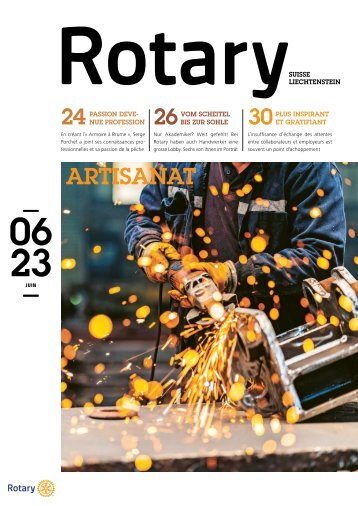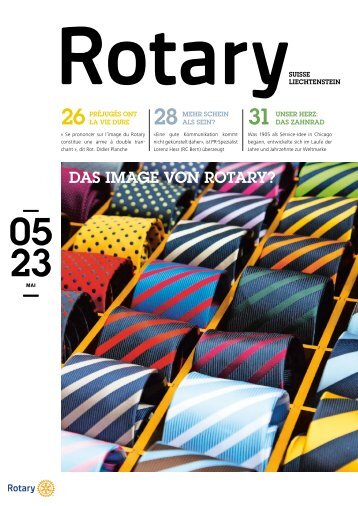Rotary Magazin 02/2023
THÈME DU MOIS –
THÈME DU MOIS – ROTARY SUISSE LIECHTENSTEIN – FÉVRIER 2023 ROTARIER IM FOKUS DIE SAAT FÜR EIN FRIEDLICHES EUROPA 30 «Musik für den Frieden», eine deutsch-russische Initiative, wurde im Herbst in der Berliner Kaiser-Willhelm-Gedächtnis-Kirche mit dem Göttinger Friedenspreis 2022 ausgezeichnet. Ein Beispiel, wie rotarisches Networking funktionieren kann. «Musik für den Frieden» wurde 2018 in Müllheim / Markgräflerland von Rot. Ulrike Vogt (RC Müllheim-Badenweiler) und ihrem Ehemann Thomas Vogt gegründet. Die Initiative wollte einen zivilgesellschaftlichen Kontrapunkt setzen zu den sich verschlechternden Beziehungen zwischen Deutschland und Russland. Die Idee dahinter: Deutsche und russische Jugendliche geben gemeinsame Konzerte mit Musik, Tanz und Theater in Deutschland und in Russland. Vorbereitend gibt es gemeinsame Probenphasen, eine intensive Zusammenarbeit, sprich: einen lebendigen Jugendaustausch. Beispielhaft will die Initiative damit zeigen: Es ist möglich, sich freundschaftlich und vertrauensvoll zu begegnen, auch unter schwierigen politischen Verhältnissen. Über Internetrecherchen lernten sich das deutsche «Ensemble MIR» und das russische «Teatr Premier» 2018 kennen. Schon ein Jahr später besuchten sich die Jugendgruppen für jeweils zehn Tage, und nach intensiven Probenphasen fanden in Russland, Deutschland und der Schweiz gemeinsame Konzerte statt. Der Rotary Club Moskau Humboldt unterstützte vor Ort den musikalischen Jugendaustausch unter anderem durch seine hervorragenden Kontakte zur Kulturabteilung der deutschen Botschaft. Auch der RC Müllheim-Badenweiler und der Distrikt 1930 setzten sich von Anfang an für das Projekt ein. Während der Coronapandemie produzierten die Ensembles über das Internet zusammen drei Musikvideos und veröffentlichten diese auf YouTube. Der Krieg in der Ukraine stellte die Initiative vor grosse Herausforderungen. Viele Städte-, Schul- und Universitätspartnerschaften wurden auf Eis gelegt. Die Initiatoren von «Musik für den Frieden» hingegen beschlossen gemeinsam, ihre Projekte fortzuführen. Längst macht «Musik für den Frieden» auch über die Grenzen der beteiligten Clubs hinaus von sich reden: Das Verbindet Jugendliche aus Deutschland und Russland über die universelle Sprache der Musik: das rotarische Projekt «Musik für den Frieden» deutsch-russische Projekt wurde am 11. September in der Berliner Kaiser-Wilhelm-Gedächtnis-Kirche mit dem Göttinger Friedenspreis 2022 ausgezeichnet. Extra für diese Preisverleihung konnten sieben Mitglieder des «Teatr Premier» aus der russischen Stadt Twer für zehn Tage nach Deutschland reisen. In der Begründung der Jury hiess es: «Musik für den Frieden wird für seinen wichtigen zivilgesellschaftlichen Beitrag zu den Beziehungen zwischen Deutschland und Russland ausgezeichnet und orientiert sich an dem deutsch-französischen Jugendwerk, das seit 1963 dazu beitrug, durch Schüleraustausch die ehemaligen Erzfeinde Deutschland und Frankreich freundschaftlich zu verbinden. Die Verleihung des Göttinger Friedenspreises 2022 soll die Preisträger unterstützen, weiter zur Erfüllung der Hoffnung beizutragen, wie sie Beethoven und Schiller im 4. Satz der 9. Sinfonie zum Ausdruck bringen: Alle Menschen werden Brüder.» Auch Holger Knaak, Präsident Rotary International 20/21, zeigte sich begeistert von der rotarischen Friedensinitiative: «Für Rotary International steht die Arbeit für Frieden und Völkerverständigung an vorderster Stelle. Musik eignet sich besonders gut, um dauerhaft Brücken für eine friedliche Welt zu schlagen. Mein Dank gilt Ulrike und Thomas Vogt. Rotary hat mit den Distrikten 1930 und 1940 und dem auf Freundschaft basierenden Netzwerk dazu beigetragen, das Konzert zum Göttinger Friedenspreis am 11. September in der Berliner Gedächtniskirche zu ermöglichen.» Wie geht es weiter? Die deutschen und russischen Jugendlichen planen neue gemeinsame Projekte. Traum ist ein deutsch-russisches Jugendwerk, das einen Keim legt für ein friedliches Europa. Dafür braucht es viele Menschen, die so eine Idee mittragen und mitgestalten. Die rotarische Familie kann auch in Zukunft einen wertvollen Beitrag leisten! K red | A zvg MUSIK FÜR DEN FRIEDEN
THÈME DU MOIS – ROTARY SUISSE LIECHTENSTEIN – FÉVRIER 2023 ROTARY PEACE FELLOWS THE SEEKER A Rotary Peace Fellow and university professor discovers that the search can sometimes be its reward. «I always felt like an outsider», says Shai Tamari. Born in Jerusalem in 1976, he served in the Israeli army from 1994 to 1997 and then knocked around the world for a few years taking odd jobs. «It was this constant search», he says. «I wasn’t aware I was searching, of course.» Then his life took an unexpected change in direction, influenced in part by a gift from Rotary International that would benefit both Tamari and Rotary. With it came not only a sense of purpose, but an acceptance of who he was and an anticipation of whom he might become. «Life’s a journey, not a destination», says Tamari. That sense of being different began in childhood in Israel. The son of a father from Romania and a mother from England, Tamari’s first spoken language was English. «I only started learning Hebrew when I went to kindergarten, which meant that when I started speaking Hebrew, I spoke with an accent», he says. Following his army service, Tamari moved to England, where he worked as a security guard, in a music store, and in the hotel industry. He remained in the hotel industry when he moved to Australia, where his mother had moved. It was there he made a surprising course correction. «I never saw myself as someone who would ever go back to school after high school», Tamari explains. «But by my mid-20s, I realized that my brain needed stimulation and that I actually wanted an education.» Tamari continued to bounce from one country to the next, earning a bachelor’s degree in Australia and a master’s in England. His next stop was the United States, where, as a Rotary Peace Fellow, he earned a second master’s at the University of North Carolina at Chapel Hill. The fellowship affected him in a handful of ways. Asked to speak at Rotary clubs and conferences, he slowly shed the insecurity he felt as a public speaker. At UNC, he also spent two years studying a new language. «My joke is that I came all the way from Jerusalem to Chapel Hill to study Arabic with somebody from the Gaza Strip», says Tamari. «And he and I became excellent friends.» And then there was his applied field experience, a two-month stint living in Amman, Jordan, between his first and second year at UNC. «I had never traveled to an Arab country, let alone lived or worked in one», says Tamari. The next chapter in Tamari’s life – a job in Washington, D. C., also came about through his Rotary connections. He spent two years drafting legislation, writing speeches, and focusing on Middle East issues. It was another eye-opener for someone who knew little about U. S. politics. Ultimately, Tamari returned to Chapel Hill, and Rotary again had a hand in that change in direction. While at UNC, he had met Terry Meyer, who at the time worked in the peace fellowship program. They married in 2009. «Terry was able to offer me the home I always longed for», he says. «I’ve always been the one who traveled around the world, and Terry always lived in North Carolina. She had the base I wanted, and I had the wings she wanted, so we combined those two things.» After the couple married, they continued to work in different cities, 270 miles (434.52 kilometers) apart. «It was not sustainable», says Tamari, who resigned from his job in Washington despite having no employment prospects in North Carolina. «At the time, I was very passionate about Middle East issues, and I found that the only job in a 250- mile radius that had anything to do with the Middle East was with what’s now the Center for the Middle East and Islamic Studies at UNC.» Tamari became the center’s associate director in 2010 – but another unanticipated change lay ahead. In 2015, Susan Carroll, the managing director of the Duke-UNC Rotary Peace Center, asked Tamari to teach the required course on negotiation and mediation to the incoming cadre of peace fellows. Today, he’s also the director of the Conflict Management Rotary Peace Fellow Shai Tamari Initiative at UNC and teaches on the topic. He hopes to one day step away from the Middle East center and concentrate exclusively on conflict management – ensuring that Rotary’s investment in Tamari will continue to reap rewards. Tamari has also adjusted his approach to dealing with conflict. «For years, I missed a crucial component of conflict management», he says. «You can’t make peace with or between other people unless you make peace with yourself.» That new way of thinking was inspired by The Work, a 2017 documentary that follows three men as they venture into Folsom State Prison in California to participate in a four-day group therapy retreat with prisoners. «It touched on all the issues I was moving toward but couldn’t articulate», Tamari says. «I watched the movie and thought, this is what my course has been missing!» That missing ingredient was a willingness to be personally vulnerable and to do «the work», which Tamari describes as «working on healing your own traumas». He began meeting online with Inside Circle Foundation, which provides training in facilitating the kind of sessions Tamari witnessed in The Work, and in 2021 he started leading sessions in North Carolina prisons. «This has changed the way I view myself, the way I teach, and the way I engage with other people», he says. K Geoffrey Johnson | A RI 31
- Seite 1 und 2: SUISSE LIECHTENSTEIN UNE EXPÉRIENC
- Seite 3 und 4: ÉDITORIAL - ROTARY SUISSE LIECHTEN
- Seite 5 und 6: SOMMAIRE - ROTARY SUISSE LIECHTENST
- Seite 7 und 8: VIE DES CLUBS 1980 - ROTARY SUISSE
- Seite 9 und 10: Warum Unternehmer:innen anders anle
- Seite 11 und 12: VIE DES CLUBS 1990 - ROTARY SUISSE
- Seite 13 und 14: VIE DES CLUBS 2000 - ROTARY SUISSE
- Seite 15 und 16: VIE DES CLUBS 2000 - ROTARY SUISSE
- Seite 17 und 18: VIE DES CLUBS 2000 - ROTARY SUISSE
- Seite 20 und 21: THÈME DU MOIS - ROTARY SUISSE LIEC
- Seite 22 und 23: ROTARIENNE EN POINT DE MIRE UNE EXP
- Seite 24 und 25: THÈME DU MOIS - ROTARY SUISSE LIEC
- Seite 26 und 27: THÈME DU MOIS - ROTARY SUISSE LIEC
- Seite 28 und 29: THÈME DU MOIS - ROTARY SUISSE LIEC
- Seite 32 und 33: ROTARY SUISSE - ROTARY SUISSE LIECH
- Seite 34 und 35: ROTARY SUISSE - ROTARY SUISSE LIECH
- Seite 36 und 37: ROTARY SUISSE - ROTARY SUISSE LIECH
- Seite 38 und 39: ROTARY SUISSE - ROTARY SUISSE LIECH
- Seite 40 und 41: ROTARY INTERNATIONAL - ROTARY SUISS
- Seite 42 und 43: ROTARY INTERNATIONAL - ROTARY SUISS
- Seite 44 und 45: ROTARY INTERNATIONAL - ROTARY SUISS
- Seite 46 und 47: ROTARY INTERNATIONAL - ROTARY SUISS
- Seite 48 und 49: ROTARY INTERNATIONAL - ROTARY SUISS
- Seite 50 und 51: ROTARY INTERNATIONAL - ROTARY SUISS
- Seite 52 und 53: ROTARY INTERNATIONAL - ROTARY SUISS
- Seite 54 und 55: NOUVEAUX MEMBRES - ROTARY SUISSE LI
- Seite 56 und 57: NEUMITGLIEDER - ROTARY SUISSE LIECH
- Seite 58 und 59: AGENDA ROTARY HIGHLIGHTS 11.03.2023
- Seite 60: helvetia.ch/immoworld Eigenheim. Ve
Unangemessen
Laden...
Magazin per E-Mail verschicken
Laden...
Einbetten
Laden...





























































































































































































